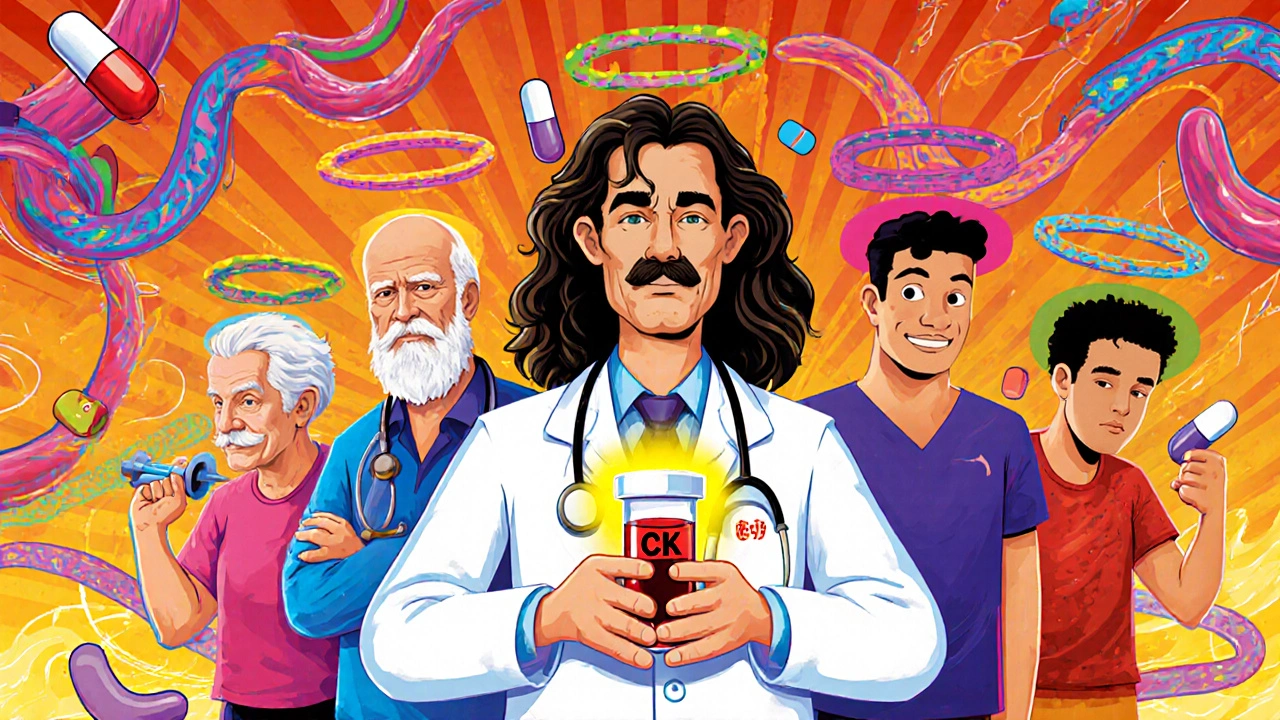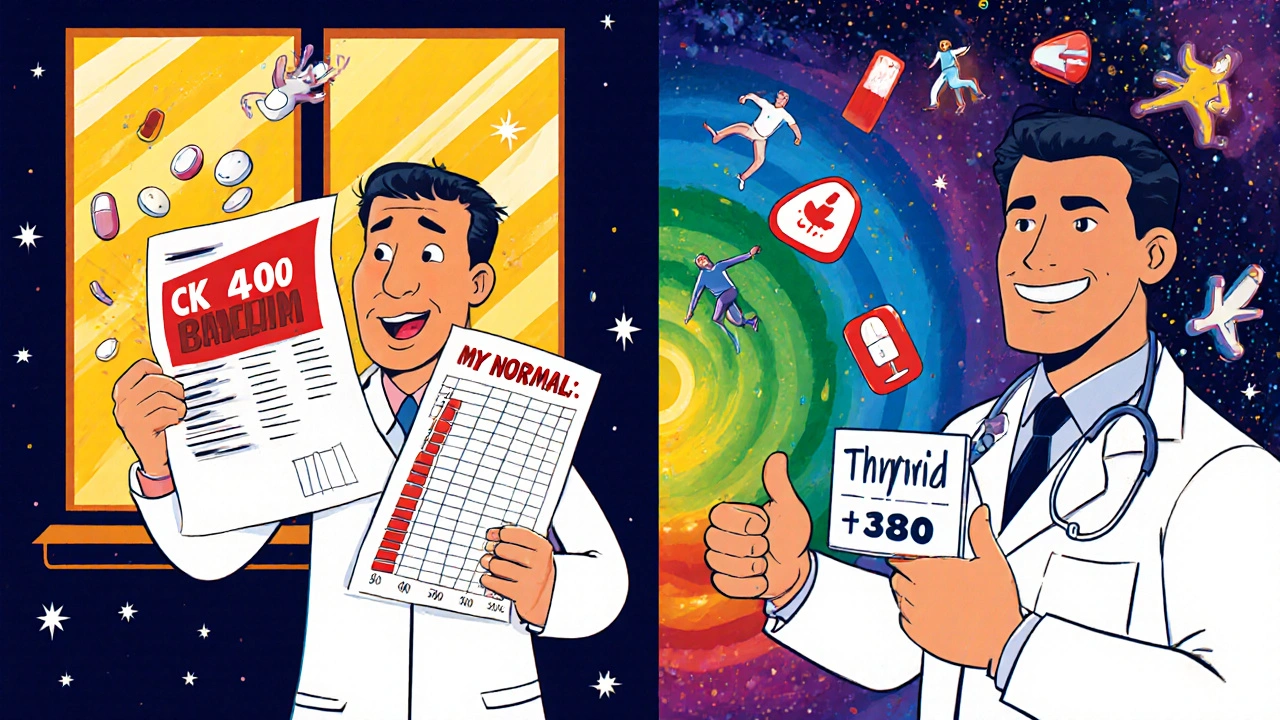Baseline CK Testing for Statins: When It’s Really Necessary
 Nov, 12 2025
Nov, 12 2025
Baseline CK Test Eligibility Checker
Is a Baseline CK Test Necessary for You?
This tool helps determine if you should get a baseline creatine kinase (CK) test before starting statin therapy based on your specific risk factors. CK testing is important for identifying muscle damage risk, but isn't necessary for everyone.
Why This Matters
Baseline CK testing is recommended for high-risk patients to identify muscle damage risk before starting statins. However, it's not necessary for everyone. If you're at risk, knowing your baseline CK helps your doctor interpret future test results and avoid unnecessary medication changes.
Important: Only about 0.1% of statin users develop severe myopathy requiring CK monitoring. But for high-risk patients, it can prevent unnecessary discontinuation of life-saving medication.
When you start a statin, your doctor might order a blood test for creatine kinase (CK) before you even take your first pill. But is this really needed for everyone? Or is it just another routine check that adds cost without real benefit? The answer isn’t simple - and it depends on who you are, what statin you’re taking, and whether you already have risk factors that make muscle damage more likely.
Why CK Testing Matters at All
Creatine kinase (CK) is an enzyme found in muscle tissue. When muscles get damaged - from intense exercise, injury, or a reaction to medication - CK leaks into the bloodstream. High levels can signal something serious: statin-induced myopathy. That’s not just sore muscles. In rare cases, it can lead to rhabdomyolysis, a life-threatening condition where muscle breaks down so badly it clogs the kidneys. The big fear came in 2001 when cerivastatin was pulled off the market after dozens of deaths from rhabdomyolysis. Since then, doctors have been more cautious. But here’s the twist: most people who take statins never have serious muscle problems. Only about 0.1% develop severe myopathy with CK levels over 10 times the upper limit of normal. So why test everyone?Who Actually Needs a Baseline CK Test?
Not everyone. But certain groups benefit a lot from knowing their starting CK level before starting a statin.- People over 75 - Muscle mass naturally declines with age. Older adults are more sensitive to statins and more likely to have kidney issues that raise risk.
- Those with kidney problems - If your eGFR is below 60 mL/min/1.73m², your body clears statins slower, increasing muscle toxicity risk.
- People on certain drug combinations - Taking a statin with fibrate (like fenofibrate), amiodarone, or cyclosporine can spike CK levels. The risk of myopathy jumps 6 to 15 times higher.
- Anyone with hypothyroidism - About 12.5% of people starting statins also have underactive thyroid. That alone can raise CK levels and mask or mimic statin side effects.
- Those who had muscle pain on statins before - If you stopped a statin in the past because of muscle aches, a baseline test helps determine if the next one is safe.
- People on high-dose statins - Atorvastatin 40-80 mg or rosuvastatin 20-40 mg carry a slightly higher risk (0.3% annually vs. 0.05% for low doses).
For these people, a baseline CK isn’t just helpful - it’s essential. It gives doctors a personal reference point. Without it, a CK level of 400 U/L might look “normal” on a lab report, but if your normal is 200, that’s a red flag.
What’s Considered Normal - And Why It Varies
Lab reference ranges for CK are broad: 65-110 U/L for women, 145-195 U/L for men. But these averages don’t tell the whole story.- African Americans often have naturally higher CK levels - up to 50-100% higher than other groups.
- Recent intense exercise, weightlifting, or even a deep muscle injection can spike CK for days.
- Up to 30% of healthy people have CK levels above the “normal” range just because of genetics or activity.
This is why population-based norms are misleading. A 2019 study found that 68% of abnormal baseline CK results could be explained by recent activity, medications, or pre-existing conditions - not statins. That’s why doctors should always ask: Did you lift weights yesterday? Take a muscle relaxant? Have thyroid issues?

The Controversy: Does It Actually Help?
Some experts say baseline CK testing is overused. Dr. John Kastelein, former president of the European Atherosclerosis Society, argues it causes more harm than good. Why? Because it creates false alarms.- A 2016 Cochrane review of nearly 48,000 patients found no difference in muscle injury rates between those who got baseline CK tests and those who didn’t.
- Choosing Wisely Canada estimates baseline CK testing costs $14.7 million a year in Canada - and only 1.2% of abnormal results change how doctors manage care.
- Many patients panic when they see an “elevated” CK, even if it’s harmless. They stop their statin - and increase their risk of heart attack or stroke.
On the other side, Dr. Robert Giugliano from Brigham and Women’s Hospital says baseline CK prevents unnecessary statin discontinuation. In one study, 78% of patients who reported muscle pain had CK levels that didn’t support a statin cause. Without a baseline, doctors had no way to prove it wasn’t the drug. That’s why practices that routinely test baseline CK see 22% fewer unnecessary statin stops.
When CK Results Guide Treatment Decisions
If you start a statin and later develop muscle pain, your baseline CK becomes your most important tool.- CK less than 3x ULN - Even with symptoms, you can usually keep taking the statin. Try lowering the dose or switching types.
- CK 3-10x ULN - Pause the statin. Check thyroid and kidney function. Re-test in a week. If it drops, restart at lower dose.
- CK above 10x ULN - Stop the statin immediately. This is a medical red flag. Get evaluated for rhabdomyolysis.
But here’s the key: CK levels alone don’t decide everything. Symptoms matter more. Someone with mild aches and a CK of 5x ULN might be fine. Someone with no pain but a CK of 8x ULN might need to stop. It’s a balance.

What to Do Before the Test
If your doctor orders a baseline CK, don’t ignore the prep instructions.- Avoid intense exercise for at least 48 hours before the test. Even a long hike or heavy lifting can raise CK.
- Don’t get muscle injections (like B12 shots or steroids) within a week before.
- Let your doctor know about all medications and supplements you take - especially fibrates, antibiotics, or herbal products.
- Record your activity level and any recent injuries. This helps interpret the result.
Testing too soon after activity gives false highs. That’s why the RxFiles protocol recommends testing within 4 weeks before starting, but ideally within 2 weeks - and only after a quiet, low-exertion period.
What Comes Next? New Tools on the Horizon
The future of statin safety might not rely on CK tests at all.- Genetic testing - A gene variant called SLCO1B1 is found in about 12% of Europeans. People with this variant have a 4.5x higher risk of simvastatin myopathy. Testing for it could replace routine CK monitoring for some.
- Point-of-care CK devices - New handheld machines, currently in late-stage trials, can give CK results in minutes during a clinic visit. This could make baseline testing easier and more common.
- Focus on patient symptoms - The FDA updated statin labels in 2023 to emphasize how patients feel over lab numbers. If you’re not having pain, a slightly high CK doesn’t mean you need to stop.
Still, for now, baseline CK remains a practical tool - especially for high-risk patients. The goal isn’t to test everyone. It’s to test the right people, at the right time, and interpret the result with context.
Bottom Line: Don’t Skip It If You’re High Risk
If you’re young, healthy, and starting a low-dose statin like pravastatin or fluvastatin, you probably don’t need a baseline CK. But if you’re over 65, have kidney trouble, take other meds, or have a history of muscle pain on statins - get the test. It’s not about fear. It’s about safety.Knowing your baseline CK helps you and your doctor make smarter choices. It prevents you from stopping a life-saving drug because of a false alarm. And in the end, that’s what matters more than saving a few dollars on a blood test.
Do I need a baseline CK test if I’m starting a statin for the first time?
Not always. If you’re young, healthy, and on a low-dose statin like pravastatin or rosuvastatin 5-10 mg, baseline CK isn’t required. But if you’re over 65, have kidney disease, thyroid issues, take other medications like fibrates or amiodarone, or had muscle pain on statins before - yes, get tested. It helps avoid unnecessary drug changes later.
Can a high CK level mean something other than statin side effects?
Absolutely. CK can rise from intense exercise, muscle injury, recent injections, hypothyroidism, or even genetics. Up to 30% of healthy people have CK above the lab’s "normal" range without any problem. That’s why doctors need your baseline - to know what’s normal for you, not just the average person.
If my CK is high but I feel fine, should I stop my statin?
No. If you have no muscle pain or weakness, and your CK is under 10 times the upper limit of normal, you can usually keep taking the statin. Many people have mildly elevated CK without any harm. Stopping a statin unnecessarily increases your risk of heart attack or stroke. Talk to your doctor before making any changes.
How often should CK be checked after starting a statin?
Routine CK monitoring isn’t recommended for asymptomatic patients. Only test again if you develop muscle pain, weakness, or dark urine. For high-risk patients - like those on statin-fibrate combos - CK is checked every 6 months. Otherwise, no need for repeat tests unless symptoms appear.
Is genetic testing replacing CK tests for statin safety?
Not yet. Genetic testing for SLCO1B1 can identify people at higher risk of simvastatin myopathy, especially in Europeans. But it’s not widely used yet due to cost and limited availability. Baseline CK is still the standard because it’s cheap, fast, and works for all statins - not just one type. Genetics may help in the future, but for now, CK remains the go-to tool.
Dominic Fuchs
November 14, 2025 AT 01:47So we're spending millions on baseline CK tests so doctors can avoid one conversation with a patient about muscle pain? Brilliant. Just brilliant. The real cost isn't the blood draw-it's the panic, the statin abandonment, and the heart attacks that follow because someone saw a number they didn't understand and ran for the hills. We treat labs like oracle stones instead of clues.
Leigh Guerra-Paz
November 15, 2025 AT 09:42Oh my gosh, this is SO important!! I’ve been telling my patients for years that CK levels mean NOTHING without context!! Like, my cousin lifted weights on Tuesday and got tested on Wednesday-his CK was 1200!! He panicked, quit his statin, and ended up in the ER with a clot because he didn’t realize it was just his dumb workout!! Please, everyone, talk to your doctor before you stop meds!!
Jerrod Davis
November 16, 2025 AT 02:09The assertion that baseline CK testing is unnecessary for low-risk patients is supported by the 2016 Cochrane review, which demonstrated no statistically significant difference in incidence of statin-induced myopathy between screened and unscreened cohorts. Furthermore, the cost-benefit analysis presented by Choosing Wisely Canada suggests a marginal clinical utility, rendering universal screening an inefficient allocation of healthcare resources.
Kenneth Lewis
November 17, 2025 AT 03:43my dr ordered a ck test and i was like... bro i just did 100 squats yesterday 😅 but he still made me do it. now i feel like a lab rat. also typo: statin not staten. lol
Joanne Beriña
November 18, 2025 AT 02:27Why are we letting foreigners tell us how to practice medicine? In America, we don’t need some Cochrane review from Europe to tell us what’s best for our patients. We know our people. We know our stats. Baseline CK saves lives. End of story.
Jordyn Holland
November 18, 2025 AT 14:15Of course the people who don't need the test are the ones screaming loudest about it. Meanwhile, the 75-year-old diabetic on simvastatin and lisinopril? Yeah, she needs it. But you? You're probably just mad because you don't want to wait a week for your results. Lazy. And frankly, a little entitled.
Casey Nicole
November 19, 2025 AT 03:49Why do we still rely on 1980s tech like CK when we have genetic markers? This is like using a flip phone in 2024. The SLCO1B1 gene test is 4.5x more accurate and costs less than a coffee. But no, let’s keep wasting time and money on outdated blood tests because ‘it’s always been done this way.’ Pathetic.
Hardik Malhan
November 19, 2025 AT 11:28CK elevation is a biomarker of myocyte stress not necessarily statin toxicity. The clinical correlation requires integration with renal function, thyroid status, and concomitant pharmacotherapy. The absence of symptoms in the presence of moderate CK elevation does not mandate discontinuation per current ACC/AHA guidelines.
ABHISHEK NAHARIA
November 20, 2025 AT 09:21In India, we don't have the luxury of routine CK testing. We treat based on symptoms, not numbers. A man with muscle pain and CK 500? He gets a lower dose. A man with CK 800 and no pain? He keeps going. Medicine is not about chasing lab values. It's about people. Why does the West overcomplicate everything?
Asbury (Ash) Taylor
November 22, 2025 AT 07:23Let’s not forget: the goal isn’t to prevent every single case of rhabdomyolysis-it’s to prevent unnecessary statin discontinuation. That’s the real win. Patients who stop statins because of a false alarm are 3x more likely to have a cardiac event within a year. This isn’t about money. It’s about survival. And if a $30 test helps someone stay alive? That’s the best ROI in cardiology.
Jim Daly
November 23, 2025 AT 14:27OMG I just found out my CK was 2000 and I didn’t even know what it meant and now I’m terrified and my doctor just said ‘eh it’s probably fine’ and I’m like… what if I turn into a puddle?? I’m literally gonna quit my statin today and eat kale and pray to the gods of cholesterol
Tionne Myles-Smith
November 24, 2025 AT 01:30Y’all are overthinking this. If you’re feeling good, keep taking your statin. If you feel like your legs are made of concrete, call your doc. Baseline CK? Great if you’re high risk. Not a big deal if you’re not. Don’t let a number scare you out of living a healthy life. You got this. 💪❤️
Jasper Arboladura
November 25, 2025 AT 19:50It’s amusing how the medical community clings to CK testing as if it were a diagnostic panacea. The SLCO1B1 polymorphism confers a relative risk of 4.5 for simvastatin-induced myopathy, yet population-level CK screening lacks predictive value. The persistence of this practice reflects institutional inertia, not clinical wisdom. One must question the epistemological foundations of current guidelines.